Twenty years have passed since Sigfried “Siggi” Loch started his ACT label in Munich (Germany). Mainly focused on European jazz, great artists as Wolfgang Haffner, Vijay Iyer, Youn Sun Nah or the late Esbjörn Svensson helped shaping an independent company which is now a must for every modern jazz listener. Arturo Mora had the chance to speak on the phone to Siggi Loch for Tomajazz.com.
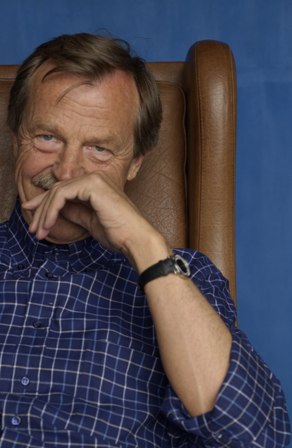
© CF Wesenberg
ARTURO MORA: First of all: congratulations for the anniversary.
SIGGI LOCH: Thank you very much.
ARTURO MORA: Let's talk about the origins: in 1992 you were the president of Warner in Europe. Then you decided to quit and form your own label. How and why did this happen?
SIGGI LOCH: Everything started in 1955 when I was a young guy and I was visiting my very first jazz concert in the city of Hanover. I saw Sidney Bechet, and I was completely fascinated by this wonderful musician and became a fan, first of Bechet and then a jazz fan. So I was introduced to the world of jazz and I became a collector. I also wanted to play this music myself, so I formed a traditional jazz band and named it after a song by Bechet: “The Red Onions”. So I was playing this music myself [as a drummer], but as I was listening more and more to records and many concerts, I realised that my talent as a musician was not so fantastic that I could envision to be up to the level of the artists that I admired. So I thought I would very much like to have my life connected with this music, and I was dreaming of having my own jazz label one day, because the first jazz record I bought was by Sidney Bechet and was on the Blue Note label, and I realised then that the founders of Blue Note were two Germans from Berlin, Alfred Lion and Francis Wolff, and I thought: “well, if they can do it maybe one day I can do it myself.”
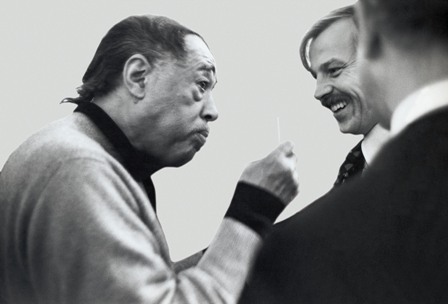
Duke Ellington & Siggi Loch
© Archiv Siggi Loch
So this is how the dream started, but to get introduced to the record business I started in 1960 as a salesman for EMI. I was not selling jazz, I was selling everything, all the music that you could sell, mainly pop music. Two years later I got the offer to become the label manager for Philips, which later became Phonogram and today is Universal, to be in charge of the jazz repertoire. That was my first step into the world of jazz in a professional basis. I also, when I got the job, I said that I would very much one day like to start becoming a producer, and in the first year, in 1962, I was listening to a German artist by the name of Klaus Doldinger, who is still one of the main jazz musicians in Germany, with his group Passport. I saw Klaus Doldinger and his band at a festival in Dusseldorf and I was fascinated by him, as I was before by Bechet, and then I talked to my bosses and they let me go into the studio and so I produced my first jazz album in December of 1962, which was the Klaus Doldinger Quartet, and that record was released under the title Jazz Made In Germany , and it was the first German jazz group that had an album released throughout the world. It was released in America in Mercury, in Japan... Everywhere. So that was my introduction as a producer, but at the same time in the same year, actually it was exactly today fifty years ago, as you call me today it's April 13 th , Friday. Fifty years ago today was the opening of the Star-Club in Hamburg, where The Beatles peformed. As I lived in Hamburg, although this was not really my music, I was watching The Beatles and many other groups from Liverpool, and I realised that a new pop music was on the horizon, and I also talked to my bosses and I got the Ok to go and record many of these English rock'n'roll bands at the Star-Club in Hamburg, and one of them were The Searchers, and I recorded a song called “Sweets For My Sweet”, which was the second number one single in England by a Liverpool band. So I was lucky in a way to get involved in something that has really nothing to do with jazz but that was important for my career, so in the years that follow I was very much involved in the recording and producing also of pop music, rock'n'roll music basically. I always continued to also record jazz artists. I recorded the first album by George Gruntz, I recorded the first album by Jean Luc Ponty and many of those, but primarily I was really involved in the pop music, so more and more I was getting away from the jazz, because at the age of 26 I became the youngest head of a record company and I got the job becoming managing director of Liberty United Artists records in Germany. Then, of course, four years later, I got the offer to become the first managing director of WEA, which is now Warner. So I became an executive and, more and more, I was not producing anymore. I was just running a record company, and this was rather successful. I was working for Warner for eighteen years, and at the end of the career I was the president of Warner Europe and then I realised that all of that had taken me away from my initial life in music, and love in music, which of course was jazz. This was in 1988. I decided to leave Warner and become an independent. That was a period where I was living in London, and I was also living two years in Majorca, and I wasn't sure. I started recording some other music, but in 1992, with the project Jazzpaña I started my own jazz label. It took actually thirty years before I realised my dream and had my own label. In 1992 I started the label and in the same year I recorded the Jazzpaña project, which you may now, and so the story of the label continued.
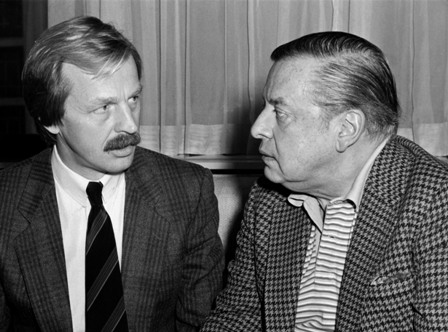
Appointment to the president of WEA Europe, Nesuhi Ertegun and Siggi Loch, 1983
© Archiv Siggi Loch
ARTURO MORA: What do you miss from the way things worked at Warner?
SIGGI LOCH: Nothing. I mean, this is a completely different thing. If you're running a different company, especially like I was, head of Europe, I had very little to do with artists and nothing to do with recordings, because that was not my job. Most of the pop artists, they record their own music and the record company is just distributing the music, so they are not part of the creative process, and even today a company like Universal or Warner are not involved in the creative process of recording music. They are just distributing and marketing music, they're not creating it. But when I started my label I was back to square one, so to speak, because I was the producer, I was in the studio with the artists, I was the publisher and I had my own label. Primarily I had to have my own label because nobody else would market the music the way I like it to be marketed. Jazz is not a very commercial music, as you know. My long time boss in Warner, Nesuhi Ertegun, whom I admired, because he was such a fantastic producer for Atlantic, he said: “you know, there is no money in jazz.” And he's right, you have to love the music to be involved in a commercial sense, because if you wanna make money you should look at other music, you can't really make money with jazz. And I didn't start the label ACT to make money, I started it to fulfil my dream.
ARTURO MORA: You have just mentioned Nesuhi Ertegun. What would you remark from your relation with him?
SIGGI LOCH: I knew Nesuhi from before he became the president of Warner International. He was, as you know, the partner and brother of Ahmet Ertegun in Atlantic, and he did all these fantastic recordings with John Coltrane, the Modern Jazz Quartet and many, many more. So I was very familiar with Nesuhi's work and I was a big fan of him, so when he asked me to join him in this new company called Warner International, which at that time was called WEA International, I said yes, but I would have never said yes to anybody else.

Mick Jagger and Siggi Loch, 1974
© Archiv Siggi Loch
ARTURO MORA: To commemorate these twenty years you have just released the Jubilee Album , which is a compilation of artists from the label. Besides its artist variety, it includes music ranging from Gustav Mahler to Burt Bacharach to Keith Jarrett to Nirvana. Was your intention to make it as eclectic as possible?
SIGGI LOCH: No. First of all, my interpretation of jazz is that it's an open art form. Of course we know that it started as an Afro-American art in the beginning, but even in the beginning more than a hundred years ago it was the result of a melting pot, of music being fused: the music from Africa fused with the music of the Caribbean and the music of Europe, of course, because in New Orleans there was a lot of march music, and that march music all came from Europe. So jazz was the result of different cultures, so I think that it's very important that jazz continues to be an open art form, and in the last twenty years, I think, more influences came from Europe than actually came from America. Therefore my interest is to follow the new developments of jazz, even in America: we signed Vijay Iyer, because to me Vijay Iyer obviously is not what the Americans would call Afro-American jazz, because his roots are Indian, they're not African. So my interest is to follow the new developments in jazz, rather than trying to follow the traditional idea of what we would call “just jazz”, you know, the true Afro-American jazz. I love that music too, but the concept of the label is to be open to all other influences as well.
ARTURO MORA: Do you think that there really exists something that we can call European jazz?
SIGGI LOCH: No, it's always up to the artist. If you listen to Esbjörn Svensson, who unfortunately does not live anymore, his music is obviously also influenced by jazz, but the stronger influences came from classical European and from rock'n'roll. So he was much more influenced ‘cause he grew up with the music of Schubert and Chopin, because his mother was a classical piano player. His father was a jazz fan, but as a kid [Esbjörn] was more interested in rock'n'roll than in any other music, and of course when he became a musician you can follow these traces in his music, but you can't call it really American jazz, it's European jazz. On the other hand if you look at an artist like Nils Landgren, who also comes from Sweden, he's much more influenced by American jazz and funk music. And of course if you look at the music of Nguyen Le, from France, that music is more than 50% influenced by the music of Jimi Hendrix. So all of this is, I think, extremely interesting, and I'm fascinated by this development of the vocabulary of jazz rather than trying to be traditional.
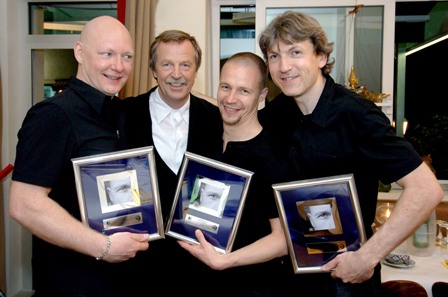
German Jazz Platin Award for e.s.t. Viaticum
© ACT / M. Kretzer
ARTURO MORA: You have just spoken about the late Esbjörn Svensson. Could you share with us some memories of Esbjörn?
SIGGI LOCH: Well, the first memory is when I found Nils Landgren, whom I had met at a jazz festival in Salzburg, which is called Jazzbaltica. He was then an artist, now he became the director of the festival this year, but then in 1994 I heard him for the first time. I had never heard his music before or had seen him before. Again I was fascinated by the artist. I wasn't interested really in recording funk music, that was not the concept of the label, but I was fascinated by the artist. When he came to Hamburg in '95 he brought along with him Esbjörn Svensson as a keyboard player, and that's when I met him for the first time, and that's when I realised immediately what an enormous potential he had as an artist, as a keyboard player. So we talked, and he told me about his music, his group, and so that's how we met. In the beginning I was not interested because he was under a contract to another label, and I said: “well, you know, it's too bad but you have a record label already.” So in order to start working with him I asked him to join Nils and recording something totally different, which was the folk music of Sweden, and we made a duo album, and that was my first recording with Esbjörn. That duo was touring in Germany and the record was successful, but e.s.t. [Esbjörn Svensson Trio], the band, was only popular in Sweden. It was only when he sent me the first test pressing of the album From Gagarin's Point Of View , when I heard that music before it was released, I knew that this was an absolute masterpiece. At this instant I knew that this was really a completely new dimension, a new chapter in the history of the jazz piano trio. So I went to Sweden and I made a deal with the label called Diesel to become a licensee of Esbjörn Svensson because I fell so much in love with that music. Then he gave me his word that once his deal with this label would come to an end he would then sign directly with ACT, which he did. So we had many, many, many years working together, we started working in 1999 and, as you know, unfortunately he passed away in 2008.
ARTURO MORA: Besides Esbjörn, you have released many records by pianists: Vijay Iyer, Yaron Herman, Michael Wollny... Do you have a preference for pianists?
SIGGI LOCH: Yes. I really feel that the piano, if you look back in the history of jazz from the very early days, starting with boogie woogie and the stride piano, the piano has really been and extremely important lifestream in jazz. The great piano players: Art Tatum, [Duke] Ellington, Count Basie, and of course Bill Evans had a tremendous influence in jazz. Of course I was influenced by Esbjörn, but then I concentrated more and more on other piano players, and by now I think we represent some of the finest piano players in jazz today, so I'm really happy about it. Yes, I have a very strong affinity for this instrument.
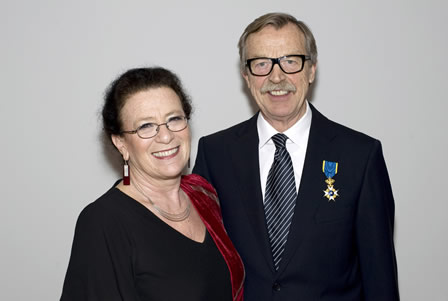
Siggi Loch receives Swedish knighthood: Ruth Jacoby (ambassador) and Siggi Loch
© Anja Grabert
ARTURO MORA: Why is your connection to Sweden so strong?
SIGGI LOCH: It was very early, when I was the leading manager for Philips in Hamburg in 1962 I did spend my vacation in Sweden, and also I was listening in Hamburg at a radio station in which there was a man organizing jazz workshops, Hans Gertberg, and he introduced a number of not only Swedish but Scandinavian musicians to this workshop, and one of them was Jan Johansson, the Swedish piano player who was the first whom I know who actually used the folk music of Sweden into a jazz context. I liked that a lot, I was fascinated by that. I was listening to his music and also I heard another Swedish musician at the time who was recording folk music with a big band, his name was Bengt-Arne Wallin. So these people are really the first ones that started what became later almost a fashion, to record jazz based on folk music.
Later, as I lived in Hamburg, as a hobby I was a sailor, so I was spending my summers always in Sweden. So I had a very strong affinity to the country and to the people of Sweden. Also in my youth I went to Copenhagen to listen to the artists that played at the Cafe Monmartre, people like Dexter Gordon, Ben Webster or Bud Powell, all these people that basically lived in Copenhagen. So I was always very much involved and interested in the Scandinavian countries, in the people and of course the jazz that was played there. So when I started the label and I met Nils Landgren at the festival I mentioned before, through Nils I met other people, apart from Esbjörn, so ACT became over the years the most successful label for Swedish jazz.
ARTURO MORA: Let's speak about business. How are sales numbers in America as compared to Europe?
SIGGI LOCH: Well, we are not really selling any records in America, because the only artist that is selling in interesting quantities is Vijay Iyer. Apart from that, we are releasing records in America, but even Esbjörn Svensson never really sold a lot of records in America. The biggest record that we released by Esbjörn Svensson was the Viaticum album, which sold over 100,000 copies in Europe, and it did not sell 5,000 copies in America, to give you an idea. The American market is really basically for the American artists who live there, and as I'm concentrating more on the European side we don't do much business in America.

Siggi Loch receives Jazzahead Skoda Award 2012
© Frank Pusch
ARTURO MORA: What about the Japanese market?
SIGGI LOCH: The Japanese market used to be extremely important, it used to be the second biggest jazz market in the world, but that's long gone. The jazz business in Japan is not as interesting anymore; as a matter of fact it's really dramatically declined and we are not selling much at the island, so today our number one market is Germany and the second one is France, and the rest is smaller, much smaller. It has a lot to do with most of our artists playing mainly in Germany, in France, in Sweden, so therefore these are our major markets, it's quite natural.
ARTURO MORA: Have the effects of the economical crisis been too hard for the label?
SIGGI LOCH: For some reason the development of ACT is absolutely contrary to the development of the international record markets. When we started, 1992 was the biggest year in the history of the record industry, in terms of sales worlwide. That's when we started. Then the music business started to decline, every year less and less. Today the record market around the world is less than 50% of what it used to be twenty years ago. At the same time our label is increasing its business every year. When Esbjörn died in 2008, that was the worst day in my life, I was actually thinking of stopping the label altogether because I lost my most important artist, I lost a dear friend and one of the most creative people I've ever met in my life, so I said I would never be able to find somebody else like him again. I was already approaching my 68 th year in life, so I said: “well, I have done it all, I had my label, I have been successful as a record executive, so why should I go on? I just should stop it.” But then what happened was that I had all these wonderful young musicians, especially Michael Wollny, the German artist that I'm really spending a lot of time and energy with, and I shouldn't leave them alone, so I decided to continue. But I was expecting the ACT business to decline with the loss of Esbjörn and, of course, the next year our business kind of declined a little bit, but then I was able to find new artists like Michael Wollny in Germany, who is selling very well now, but also artists like Leszek Mozdzer, the Polish superstar who's selling a lot of records, or Youn Sun Nah, the Korean singer, who has the biggest album in France last year. So ACT was able to continue to grow in spite of the industry that is declining and in spite of the tremendous loss of our biggest artist Esbjörn Svensson.
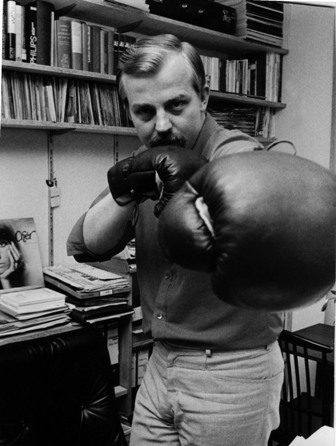
Siggi Loch, 1967
© Archiv Siggi Loch
ARTURO MORA: What about illegal mp3 downloading?
SIGGI LOCH: What can I say? We cannot stop the development of technology, it's not possible. People are stealing music, they think that music should be for free... There's nothing I can do about it. I ignore this. For us the downloading business is unimportant, it's less than 10% of our business, so we are concentrating to record and market music for people who love to own a piece of product, right? And I continue to make records for those people around the world, and I'm very happy that we are able to increase our business by being so, and ignoring what's happening in the downloading business ‘cause I can't stop it and if I would spend too much time thinking about it, it would kind of make me angry and it would not be good for what I'm doing.
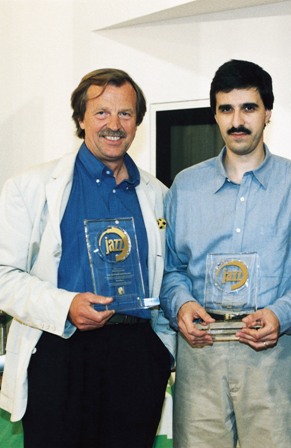
German Jazz Award for Vince Mendoza Jazzpaña, 1996
© Archiv Siggi Loch
ARTURO MORA: You have received some Grammy nominations: the first one with Jazzpaña , last year with Vijay Iyer's Historicity ... Do you think you could increase your business in the American market if some of your artists won a Grammy award?
SIGGI LOCH: No, I don't see it makes much difference. I mean, it's nice to have a Grammy, it's wonderful, but... You know, jazz was created in America, but America is not interested in its own culture, much more in movies or in visual art, but there is not much development for jazz. All the great American jazz artists would have a problem making a living if they could not work in Europe, they make their money here. In Europe the people have a much higher level of interest in jazz than in America.
ARTURO MORA: Did the way the also-Munich based ECM label worked influence you when you started ACT?
SIGGI LOCH: No. I happen to be in Munich... It's an interesting development: if you look back in history, historically speaking the most important historical label was Blue Note, but merely only until the original founders sold the company in 1968... They sold it in '66, but they eventually stopped working for it in '68. That was really the end of Blue Note, it was later revitalized by Bruce Lundvall, but when the people talk about Blue Note today they always talk and think about the Blue Note of the 60's, and not the Blue Note of the 80's.
When Blue Note stopped ECM started, in 1969, and it came out in Munich, but also from Munich came Enja and obviously ACT. From some reason Munich is a wonderful breeding ground for jazz labels. I don't know why, but that's the way it is. But I was not influenced. Obviously I have the greatest respect and admiration for Manfred Eicher and what he has done, because ECM is certainly the number one jazz label today, but it doesn't matter, it's fine, we do what we do and I'm very happy that we can do it.

© CF Wesenberg
ARTURO MORA: By the way, where does the name of the label come from?
SIGGI LOCH: I invented the idea of calling the label ACT already in 1966, when I made my first drawing of the label. I was looking for a word... I learned something from Atlantic, Ahmet Ertegun said that the label should be starting with an A because it's the first in the alphabet and so you are the first to get paid. [laughs] So I said: “Ok, it should be starting with an A.” And then I said ACT is for acting, it's for an artist rather than being a musician. The artist is more than a musician, he has to have a charisma on the stage... A musician plays music, but an artist is more than that, he's a musician but he's more than just a musician. That's why I called the label ACT.
ARTURO MORA: Where do you think is the future of music distribution?
SIGGI LOCH: I don't know, ask me an easier question. [laughs]
ARTURO MORA: Ok, a very easy one then, just to finish: which are the next steps for ACT?
SIGGI LOCH: We continue to record and release every year about twenty-four records, that's what we're aiming for, it was more than thirty last year, but I hope this year there'll be no more than twenty-four, because we cannot handle more than that in a professional way, because we think that we have an obligation to have our artists to become popular, and not just to put records out and hope for good reviews, that's not what we do. We like big reviews as well, but we don't put records out for good reviews, we put records out to reach people that would like to buy that music, pay for it and make it part of their life. That's a lot more difficult than just putting a record out and wait for a good review.
So we are continuing to record artists that have a desire to communicate with a large audience, larger than they would normally could without us. Our job is to find the artists more fans, more interesting buyers and followers and lovers than they would do if they would not be with ACT.

